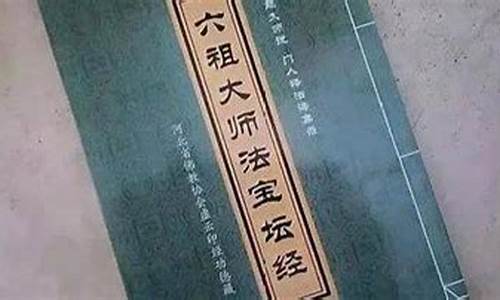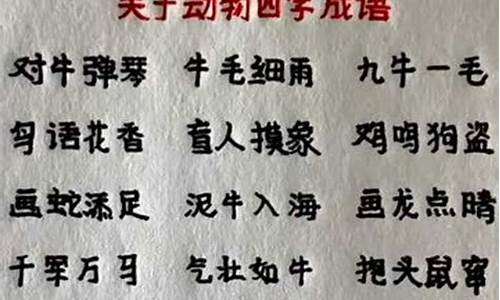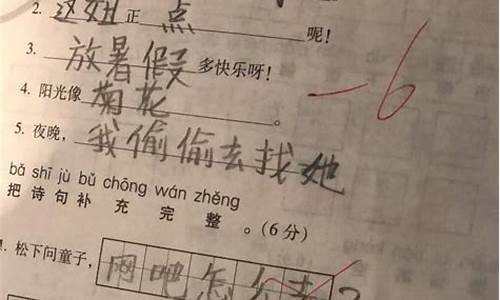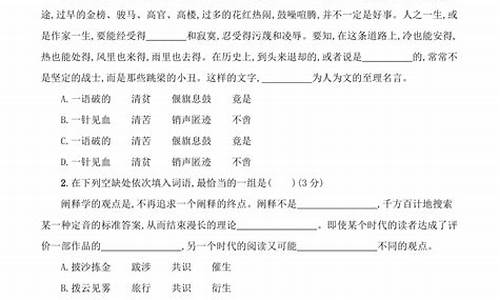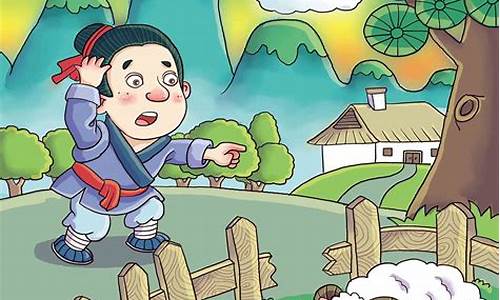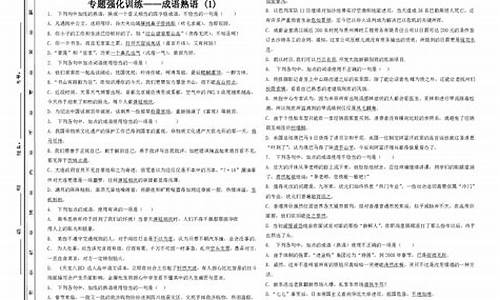中文成语的经典英语翻译_中文成语的经典英语翻译是什么
大家好,很高兴有机会和大家一起探讨中文成语的经典英语翻译的问题。我将用专业的态度回答每个问题,同时分享一些具体案例和实践经验,希望这能对大家有所启发。
1.经典英语成语故事及翻译(五篇)
2.翻译 将成语翻译成英语
3.谁能帮我整理一下历年高考英语翻译题中出现的成语(中文加英文),简略
4.有关英语的成语大全
5.经典成语的英语翻译
6.谁英语好?帮我翻译

经典英语成语故事及翻译(五篇)
#能力训练# 导语成语在古代汉语与现代汉语的传承上占有重要的地位,它是汉语词汇系统中重要而又极富特色的组成部分。下面是 无 分享的经典英语成语故事及翻译经典英语成语故事及翻译(五篇)。欢迎阅读参考!
1.经典英语成语故事及翻译
卧薪尝胆
During the Spring and Autumn period (770-476BC), the State of Wu launched an attack against the State of Yue. The King of Wu was seriously wounded and soon died. His son Fu Chai became the new King. Fu was determined to get revenge. He drilled his army rigidly until it was a perfect fighting force. Three years later, he led his army against the State of Yue and caught its king Gou Jian. Fu took him to the State of Wu.
春秋时期,吴国和越国之间进行了一场战争,吴王不幸受了重伤,不久就死了。他的儿子夫差作了吴国的新国王,他发誓要替父亲报仇。于是,他严格的操练他的士兵,把他们训练成了一支非常厉害的军队。三年以后,他对越国发动了战争,抓住了越王勾践,把他带回了吴国。
In order to avenge his father's death, Fu let him live in a shabby stone house by his father's tomb and ordered him to raise horses for him. Gou pretended to be loyal to Fu but he never forgot his humiliation. Many years later, he was set free. Gou secretly accumulated a military force after he went back to his own state. In order to make himself tougher he slept on firewood and ate a gall-bladder before having dinner and going to bed every night. At the same time he administered his state carefully, developing agriculture and educating the people. After a few years, his country became strong. Then Gou seized a favorable opportunity to wipe out the State of Wu.
为了复仇,夫差让勾践住在他父亲墓旁的破石屋里天天看墓、喂马。勾践表面上服从,心里面却想着复仇。几年以后,勾践被放回越国。他立刻开始秘密聚集一支军队。为了提醒自己不要忘了报仇,他睡在柴上,还每天在吃饭睡觉前尝一尝苦胆。同时,他专心治理国家,大力发展农业,加强民众教育。几年后,越国又变得强大起来,然后,勾践抓住一个适当的机会消灭了吴国。
Later, people use it to describe one who endures self-imposed hardships to strengthen one's resolve to realize one's ambition.
后来,人们用它来形容人刻苦自励以达到自己定下的目标。
2.经典英语成语故事及翻译
望梅止渴
Quenching Thirst by Watching Plums
One summer, Cao Cao was leading his troops in a punitive expedition against Zhang Xiu. It was extraordinarily hot. The burning sun was like a fire, and the sky was cloudless. The soldiers were walking on the winding mountain paths. The dense forest and the hot rocks exposed to the sun on both sides of the paths made the soldiers feel suffocated. By noontime the soldiers' clothes were wet through with sweat, and the marching speed slowed down. Some solders of weak physique even fainted on the roadside.
Seeing that the marching speed was slower and slower, Cao Cao was very worried because he feared that he might bungle the chance of winning the battle. But how could they quicken their speed? Cao Cao at once callde the guide and asked him on the quiet whether there was a source of water nearby. The guide shook his head, saying that the spring water was on the other side of the mountain, which was very far to have to make a detour to reach. Cao Cao realized that time didn't permit them to make such a detour. After thinking for a moment, he said to the guide, "Keep quiet. I'll find a way out." He knew that it would be to no avail to order his troops to quicken the steps. He had a brain wave and found a good solution. He spurred his horse and came to the head of the column. Pointing his horsewhip to the front, Cao Cao said, "Soldiers, I know there is a big forest of plums ahead. The plums there are both big and delicious. let's hurry along, and we will reach the forest of plums after bypassing this hill." When the solders heard this, they immediately slobbered. Picturing in their minds the sweet and sour flavour of the plums, the soldiers felt as if they were actually eating the plums, the soldiers felt as if they were actually eating the plums themselves. The morale greatly boosted, the soldiers quickened their steps a great deal automatically.
This story comes from "The Fake Tangery" in Anecdotes of This World by Liu Yiqing of the Southern Dynasties period (420-589). From this story, people have derived the set phrase "quenching thirst by watching plums" to refer to trying to comfort oneself of others by idle dreams.
有一年夏天,曹操率领部队去讨伐张绣,天气热得出奇,骄阳似火,天上一丝云彩也没有,部队在弯弯曲曲的山道上行走,两边密密的树木和被阳光晒得滚烫的山石,让人透不过气来。到了中午时分,士兵的衣服都湿透了,行军的速度也慢下来,有几个体弱的士兵竟晕倒在路边。
曹操看行军的速度越来越慢,担心贻误战机,心里很是着急。可是,眼下几万人马连水都喝不上,又怎么能加快速度呢?他立刻叫来向导,悄悄问他:“这附近可有水源?”向导摇摇头说:“泉水在山谷的那一边,要绕道过去还有很远的路程。”曹操想了一下说,“不行,时间来不及。”他看了看前边的树林,沉思了一会儿,对向导说:“你什么也别说,我来想办法。”他知道此刻即使下命令要求部队加快速度也无济于事。脑筋一转,办法来了,他一夹马肚子,快速赶到队伍前面,用马鞭指着前方说:“士兵们,我知道前面有一大片梅林,那里的梅子又大又好吃,我们快点赶路,绕过这个山丘就到梅林了!”士兵们一听,仿佛已经吃到嘴里,精神大振,步伐不由得加快了许多。
故事出自《世说新语?假谲》。成语“望梅止渴”,比喻用空想安慰自己或他人。
3.经典英语成语故事及翻译
一鸣惊人
In the Warring States Period, Duke Wei of Qi neglected state affairs, for the first three years of his reign, giving himself over to dissipation. One of his ministers, Chun Yukun who had a good sense of humour, said to him: 'There is a big bird which has neither taken wing nor sung for three years.' The duke answered, 'Once that bird starts to fly and sing, it will astonish the world.' The duke thereupon devoted himself to his duties and built his state up into a powerful one.
战国时代,齐威王即位后做了三年国君,只顾享乐,不理政事。有个善于说笑话的人叫淳于髡,一天对齐威王说:“城里有一只大鸟,三年不飞也不叫,你知道这是什么道理?”齐威王说:“这鸟不飞则罢,一飞就冲天;不鸣则罢,一鸣就惊人。”在淳于髡的激发下,齐威王开始治理国家,取得很大成绩,齐国的声威一直保持了几十年。
4.经典英语成语故事及翻译
精卫填海
Once upon a time, the youngest daughter of Emperor Yan, legendary ruler of primitive China, went boating on the Eastern Sea. While she was enjoying herself, a strong wind rose on the sea and her boat capsized. Just before she was buried by the surging waves, her spirit turned into a beautiful bird. As it flew over the roaring sea, it cried sadly in the sound "jinwei, jingwei". That was why people called it "Jingwei".
The bird lived on a mountain near the sea. It hated the sea so much that it decided to fill it up. Every day, it flew to and fro between the mountain and the sea, carrying in a twig or a pebble from the mountain and dropping it into the sea.
One day, the roaring sea said to Jingwei, "Poor little bird, stop doing that meaningless thing! You'll never fill me up." Jingwei replied, "I'll fill you up no doubt! I will, even if it'll take me thousands of years! I'll fight on until doomsday!"
The brave little bird kept carrying twigs and pebbles from the mountain to the Eastern Sea without taking a rest.
From this fable comes the idiom "The bird Jingwei trying to fill the sea". We use it to describe people who are firm and indomitable and will not stop until they reach their goal.
从前,炎帝(传说中中国原始社会的统治者)的小女儿在东海上划船。正当她划得高兴时,海面上突然升起一阵大风,把她的小船弄翻了。就在她要被汹涌的波浪吞 没时,她的灵魂变成了一只美丽的小鸟。它飞过那咆哮的海面,伤心的叫着"精卫,精卫"的声音。所以人们就叫她"精卫"。
精卫鸟住在靠海的一座山上。它非常恨大海,所以决心要把它填平。它每天来回于山海之间,把从山上衔来的小树枝和小石子扔在大海里。
一天,咆哮的大海对精卫说:"可怜的小鸟,停止你那无谓的举动吧!你是永远都填不平我的。" 精卫回答说:"我当然会把你填平的!即使这需要千千万万年的时间,我也一定会斗争到底,直到你的末日来临!"
这只勇敢的小鸟继续从山上衔来小树枝和小石子,扔到东海中,从未有片刻休息。
"精卫填海"这个成语就是由这个传说而来的,形容那些坚定不移,不屈不挠,不到目的决不罢休的人。
5.经典英语成语故事及翻译
fail the exam
名落孙山
In the Song Dynasty (宋朝) there was a joker called Sun Shan(孙山).
宋朝有一个很幽默的人,他叫孙山。
One year he went to take the imperialexamination, and came bottomof the listof successfulcandidates.
有一年他去参加考试,公布名单时他是最后一名。
Back in his hometown, one of his neighbor asked him whetherthe neighbor's son had also passed.
回到家,他的邻居向他打听自己的儿子考得怎么样。
Sun Shan said, with a smile:"Sun Shan was the last on the list. Your son came after Sun Shan."
孙山笑着对邻居说:“孙山考了最后一名,你儿子的名字还在孙山的后面呢。”
The peopleused this idiom to indicatefailing in an examination or competition.
人们用“名落孙山”来比喻考试没有考上或者选拔没有被录取。
翻译 将成语翻译成英语
1.爱屋及乌 Love me, love my dog.
2.百闻不如一见 Seeing is believing.
3.比上不足比下有余 worse off than some, better off than many; to fall short of the best, but be better than the worst.
4.笨鸟先飞 A slow sparrow should make an early start.
5.不眠之夜 white night
6.不以物喜不以己悲 not pleased by external gains, not saddened by personnal losses
7.不遗余力 spare no effort; go all out; do one's best
8.不打不成交 No discord, no concord.
9.拆东墙补西墙 rob Peter to pay Paul
10.辞旧迎新 bid farewell to the old and usher in the new; ring out the old year and ring in the new
11.大事化小小事化了 try first to make their mistake sound less serious and then to reduce it to nothing at all
12.大开眼界 open one's eyes; broaden one's horizon; be an eye-opener
13.国泰民安 The country flourishes and people live in peace
14.过犹不及 going too far is as bad as not going far enough; beyond is as wrong as falling short; too much is as bad as too little
15.功夫不负有心人 Everything comes to him who waits.
16.好了伤疤忘了疼 once on shore, one prays no more
17.好事不出门恶事传千里 Good news never goes beyond the gate, while bad news spread far and wide.
18.和气生财 Harmony brings wealth.
19.活到老学到老 One is never too old to learn.
20.既往不咎 let bygones be bygones
21.金无足赤人无完人 Gold can't be pure and man can't be perfect.
22.金玉满堂 Treasures fill the home.
23.脚踏实地 be down-to-earth
24.脚踩两只船 sit on the fence
25.君子之交淡如水 the friendship between gentlemen is as pure as crystal; a hedge between keeps friendship green
26.老生常谈陈词滥调 cut and dried, cliché
27.礼尚往来 Courtesy calls for reciprocity.
28.留得青山在不怕没柴烧 Where there is life, there is hope.
29.马到成功 achieve immediate victory; win instant success
30.名利双收 gain in both fame and wealth
31.茅塞顿开 be suddenly enlightened
32.没有规矩不成方圆 Nothing can be accomplished without norms or standards.
33.每逢佳节倍思亲 On festive occasions more than ever one thinks of one\'s dear ones far away.It is on the festival occasions when one misses his dear most.
34.谋事在人成事在天 The planning lies with man, the outcome with Heaven. Man proposes, God disposes.
35.弄巧成拙 be too smart by half; Cunning outwits itself
36.拿手好戏 masterpiece
37.赔了夫人又折兵 throw good money after bad
38.抛砖引玉 a modest spur to induce others to come forward with valuable contributions; throw a sprat to catch a whale
39.破釜沉舟 cut off all means of retreat;burn one‘s own way of retreat and be determined to fight to the end
40.抢得先机 take the preemptive opportunities
41.巧妇难为无米之炊 If you have no hand you can\'t make a fist. One can\'t make bricks without straw.
42.千里之行始于足下 a thousand-li journey begins with the first step--the highest eminence is to be gained step by step
43.前事不忘后事之师 Past experience, if not forgotten, is a guide for the future.
44.前人栽树后人乘凉 One generation plants the trees in whose shade another generation rests.One sows and another reaps.
45.前怕狼后怕虎 fear the wolf in front and the tiger behind hesitate in doing something
46.强龙难压地头蛇 Even a dragon (from the outside) finds it hard to control a snake in its old haunt - Powerful outsiders can hardly afford to neglect local bullies.
47.强强联手 win-win co-operation
48.瑞雪兆丰年 A timely snow promises a good harvest.
49.人之初性本善 Man's nature at birth is good.
50.人逢喜事精神爽 Joy puts heart into a man.
51.人海战术 huge-crowd strategy
52.世上无难事只要肯攀登 Where there is a will, there is a way.
53.世外桃源 a fictitious land of peace away from the turmoil of the world;
54.死而后已 until my heart stops beating
55.岁岁平安 Peace all year round.
56.上有天堂下有苏杭 Just as there is paradise in heaven, ther are Suzhou and Hangzhou on earth.
57.塞翁失马焉知非福 Misfortune may be an actual blessing.
58.三十而立 A man should be independent at the age of thirty.At thirty, a man should be able to think for himself.
59.升级换代 updating and upgrading (of products)
60.四十不惑 Life begins at forty.
61.谁言寸草心报得三春晖 Such kindness of warm sun, can\'t be repaid by grass.
谁能帮我整理一下历年高考英语翻译题中出现的成语(中文加英文),简略
楼上翻得挺好。这是我自己翻的:
杯弓蛇影:Assume the reflection of a bow in the wine cup as a snake.
烈火见真金:Fire tests gold.
狐假虎威:A fox takes the influence of a tiger.
异曲同工:Different ruler, the same work of art.
集腋成裘:You can make a cloak by collecting the fur of the armpit of foxes. (或者:Many a little makes a mickle.)
有眼不识泰山:Can't recognise Mount Tai with both eyes.
有关英语的成语大全
我已经高中毕业很多年了 但是能给你提供一下常用的英语成语
the apple of one's eye 掌上明珠
cast beards before swine 对牛弹琴
(an) eye for eye 以牙还牙
fall by the wayside 半途而废
make bricks without straw 巧妇难为无米之炊
the scales fell from one's eyes 恍然大悟
see eye to eye 意见一致
sow the wind and reap the whirlwind 恶有恶报
cut and run 金蝉脱壳
by and large 总而言之
burns one's boats 破釜沉舟
see how the wind blows 见风使舵
on one's beam 江郎才尽
希望对你有用
经典成语的英语翻译
1.百闻不如一见Seeing is believing.?2.笨鸟先飞A slow sparrow should make an early start.?
3.岁岁平安?Peace?all?year?round.
4.四十不惑?Life?begins?at?forty.
5.时不我待Time?and?tide?wait?for?no?man.
6.杀鸡用牛刀break?a?butterfly?on?the?wheel
7.不遗余力?spare?no?effort;?go?all?out;?do?one's?best
8.不打不成交?No?discord,?no?concord.
9.拆东墙补西墙?rob?Peter?to?pay?Paul
10.好了伤疤忘了疼?once?on?shore,?one?prays?no?more
11.功夫不负有心人?Everything?comes?to?him?who?waits.
12.大开眼界?open?one's?eyes;?broaden?one's?horizon;?be?an?eye-opener
13.国泰民安?The?country?flourishes?and?people?live?in?peace
14.和气生财?Harmony?brings?wealth.
15.活到老学到老?One?is?never?too?old?to?learn.
16.既往不咎?let?bygones?be?bygones
17.金玉满堂?Treasures?fill?the?home.
18.脚踏实地?be?down-to-earth
19.脚踩两只船?sit?on?the?fence
20.礼尚往来?Courtesy?calls?for?reciprocity.
一天记20个刚好哦~~~
谁英语好?帮我翻译
A friend in need is a friend indeed.患难见真情。
Actions speak louder than words.事实胜于雄辩
All is not gold that glitters.闪光的不一定都是金子
An idle youth, a needy age.少壮不努力,老大徒伤悲
Bitter pills may have wholesome effects.良药苦口
Do wrong once and you"ll never hear the end of it.一失足成千古恨
Every cloud has a silver lining.守得云开见月明
Every man has his fault.人孰无过
First come, first served.捷足先登
Haste makes waste.欲速则不达
Honesty is the best policy.诚实至上
In fair weather prepare for foul.未雨绸缪
Knowledge is power.知识就是力量
Let bygones be bygone.既往不究
Look before you leap.三思而后行
Man proposes, God disposes.谋事在人,成事在天
Money talks.金钱万能
No gains without pains.吃得苦中苦方为人上人
请问如何翻译中文的成语成英文?
1.rise in rebellion 揭竿而起
2.stand together through thick and thin 风雨同舟
3.repeated a whole-hearted invitation 三顾茅庐
4.many drops of make an ocean 集腋成裘
将下列成语译成英语:
1.杯弓蛇影 an illusory snake in a goblet
2.烈火见真金 Fire proves gold
3.狐假虎威 The fox borrows the tiger’s fierceness
4.异曲同工 different tunes sung with equal skill
5.集腋成裘 Little and often fills the purse
6.有眼不识泰山 Entertain an angel unawares.
这是一个很大的课题,不少学者专门出书或发表若干论文去阐述这一论题。不过,简单来说,常见的方法有以下几种:
1、直译:前提是不是中文文化背景下特有的、直译过去不会引起歧义或造成不解的,如“一石二鸟”可译成“to kill two birds with one stone”;“易如反掌”可译成“as easy as turning over one's hand”,“火中取栗”可译成“to pull the chestnut out of the fire”,这样子翻译既通俗易读,又十分形象。
2、以英语里的相近或相等的成语替换:如“爱屋及乌”可译成“Love me,love my dog”;“趁热打铁”可译成“to strike while the iron is hot”;“破釜沉舟”可译成“to burn one’s boats”;“隔墙有耳”可译成“Wall have ears”;这样子方便直接,当然也颇考译者的词汇量。
3、有时为了忠实于原文,但又为免引起误解,就采用直译+意译的方式,即先直译过来,再在后面加上解释:如“水中捞月”译成“to fish for moon in the water—to make impractical or vain efforts ”,“门庭若市”译成“ the courtyard is as crowed as a market place—a much-visited house ”。
4、意译:即直接按意思翻译出来。所有的东西,都可以通过意译的办法翻译出来,只是意译的话就丢失了原文的意境、修辞、幽默感等等。但是很多成语都是中国文化里所特有的,或带有强烈的中国文化色彩,无法通过以上方法翻译出来。这些成语,如果直译的话,外国人可能根本不知所云,这时就要采用意译的办法,将成语的意思翻译出来就好了。如“得陇望蜀”译成“be insatiable”,“不管三七二十一”译成“regardless of the consequences”,“凤毛麟角”译成“priceless value”。
今天关于“中文成语的经典英语翻译”的探讨就到这里了。希望大家能够更深入地了解“中文成语的经典英语翻译”,并从我的答案中找到一些灵感。
声明:本站所有文章资源内容,如无特殊说明或标注,均为采集网络资源。如若本站内容侵犯了原著者的合法权益,可联系本站删除。

